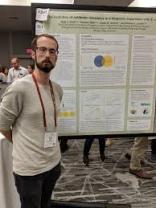Algal microbiomes alter competitive interactions between their hosts
Phytoplankton communities are responsible for half of Earth’s net primary productivity and their community composition is a regulator of many biogeochemical cycles and food web dynamics. Bacteria associated with phytoplankton have been shown to affect host fitness, either negatively or positively, but how these associated microbiomes influence phytoplankton interspecific interactions and coexistence remains untested.
Microbial Experimental Ecology and Evolution Reading Group
Microbial Experimental Ecology and Evolution Reading Group
EEB Thursday Seminar: Probing the structure of fitness landscapes with experimental evolution
The ability to evolve and adapt is a fundamental property of living systems. In many populations, the process of adaptive evolution can be thought of as an uphill walk of a population on a "fitness landscape" where mutations are steps and fitness is altitude. Understanding the structure of fitness landscapes is a fundamental open problem in evolutionary biology. I will discuss our efforts to probe the fitness landscapes and the adaptive walks on them using experimental microbial populations. I will show some interesting and perhaps somewhat counter intuitive patterns that we found.
Complex interactions and spatial patterns in ecological communities
Ecological communities are very complex systems comprising species that interact with each other in spatially extensive settings. Understanding the rules that govern these systems and how they behave in time is fundamental, but it is also of practical importance since it concerns the maintenance of biodiversity in the face of global change.
Phenotypic and genotypic changes in the evolution of antibiotic resistance after decades of relaxed selection
Populations often encounter environmental changes that remove selection for the maintenance of certain phenotypic traits. The resulting decay of these traits under relaxed selection reduces an organism’s fitness in its prior environment. However, how these traits subsequently evolve upon restoration of selection is not well-understood. We addressed this question using Escherichia coli strains from the long-term evolution experiment (LTEE) that have been independently evolving for multiple decades in the absence of antibiotics.
EEB Tuesday Lunch Seminar: Genomic insights into the spread of carbapenem-resistant Klebsiella pneumoniae within and between hospitals
The emergence and worldwide dissemination of antibiotic resistant organisms represents a significant threat to global public health. An organism that epitomizes both the urgency and challenges associated with this threat is carbapenem-resistant Klebsiella pneumoniae (CRKP). CRKP was first observed in a clinical case in 1996, in a hospital in North Carolina. Since that time, successful lineages of CRKP have spread across the globe, becoming endemic in healthcare networks in many regions.
EEB Thursday Seminar: Developing a more complete view of the tree of life in the genomics era
The tree of life is a foundational concept for the biological sciences. Over the last few decades, herculean efforts by researchers have dramatically increased the available data with which we can better understand the structure and the processes that shape evolutionary relationships. However, despite these advances, new challenges have emerged. Here, I describe several projects that aim to better reconstruct a more complete view of the complexity underlying phylogenies. Specifically, I demonstrate the extensive genome conflict present in virtually all genomic datasets.
Microbial controls on the degradation of permafrost soil carbon following thaw
EEB Tuesday Lunch Seminar
12th ANNUAL EARLY CAREER SCIENTISTS SYMPOSIUM "FRONTIERS IN COMMUNITY ASSEMBLY"
We are pleased to announce this year's Early Career Scientist Symposium, Frontiers in Community Assembly, to be held Saturday, March 12, 2016 in the Chemistry Building on the campus of the University of Michigan, Ann Arbor. The symposium will focus on the integration of evolutionary and ecological perspectives to understand community assembly.
Dimensions of Biodiversity - NSF
Despite centuries of discovery, most of our planet's biodiversity remains unknown. The scale of the unknown diversity on Earth is especially troubling given the rapid and permanent loss of biodiversity across the globe. The goal of the Dimensions of Biodiversity campaign is to transform, by 2020, how we describe and understand the scope and role of life on Earth. This campaign promotes novel integrative approaches to fill the most substantial gaps in our understanding of the diversity of life on Earth.







